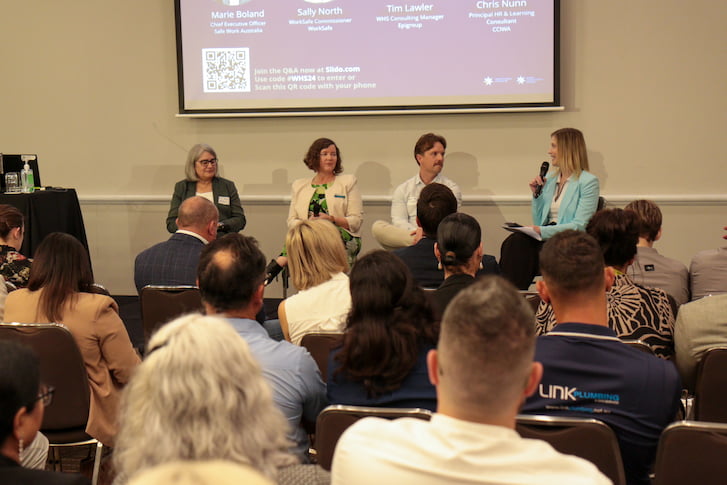The complexity of workplace health and safety (WHS) regulations and codes of practices continue to be a challenge for businesses, a CCIWA and Australian Chamber of Commerce and Industry (ACCI) event highlighted.
 At the WHS Changes and Challenges event this morning at the Parmelia Hilton about 80 attendees heard from WorkSafe WA Commissioner Sally North, Safe Work Australia (SWA) CEO Marie Boland and Epigroup WHS Consulting Manager Tim Lawler.
At the WHS Changes and Challenges event this morning at the Parmelia Hilton about 80 attendees heard from WorkSafe WA Commissioner Sally North, Safe Work Australia (SWA) CEO Marie Boland and Epigroup WHS Consulting Manager Tim Lawler.
The event coincided with National Safe Work Month, themed ‘Safety is everyone’s business’, with psychosocial risks, chemicals and updates on new or amended codes being key topics raised.
“The theme is really about making a safe and healthy working environment a fundamental principle across all industries and occupations, and reinforces the benefit of committing to safer workplaces for workers, employers, businesses and the community more generally,” Boland said.
Red tape hindering WHS outcomes
ACCI Director of Health and Safety Policy Jennifer Low said businesses were finding it increasingly onerous to keep up with the various regulatory changes, on top of other challenges such as workplace industrial relations laws, skills shortages and sustainability compliance.
“It’s a really red tape-heavy environment at the moment for businesses, so they are having to choose and prioritise,” she said.
“Unfortunately, with limited time, resources and [rising] costs, there will be limited capacity to make those [WHS] improvements.”
Low said simplified regulations and easy to use resources could help cut red tape and boost capability for businesses.
Four steps towards building an effective WHS culture:
Lawler gave four ways businesses can create a positive WHS workplace culture:
- It starts with leadership, but get the people who actually face the risks involved in the consultation process
- Less is more in regard to critical control management
- Determine who your experts are so they can be involved in producing “good work methods”
- Use technology (such as artificial intelligence) to simplify complex themes
He also provided guidance on where businesses can start with addressing psychosocial risks.
“Don’t start with the individual … treat [psychosocial risk] a bit differently to how you would in normal risk management and make it more of a collaborative, strategic process,” he said.
“Ensure that you are sending the message about why you are doing it – including, because it’s the right thing to do, it’s good for business, it’s good for risk management and because you have to.”
For more information on how Epigroup’s services can help your business, call 1300 414 313 or email [email protected].












